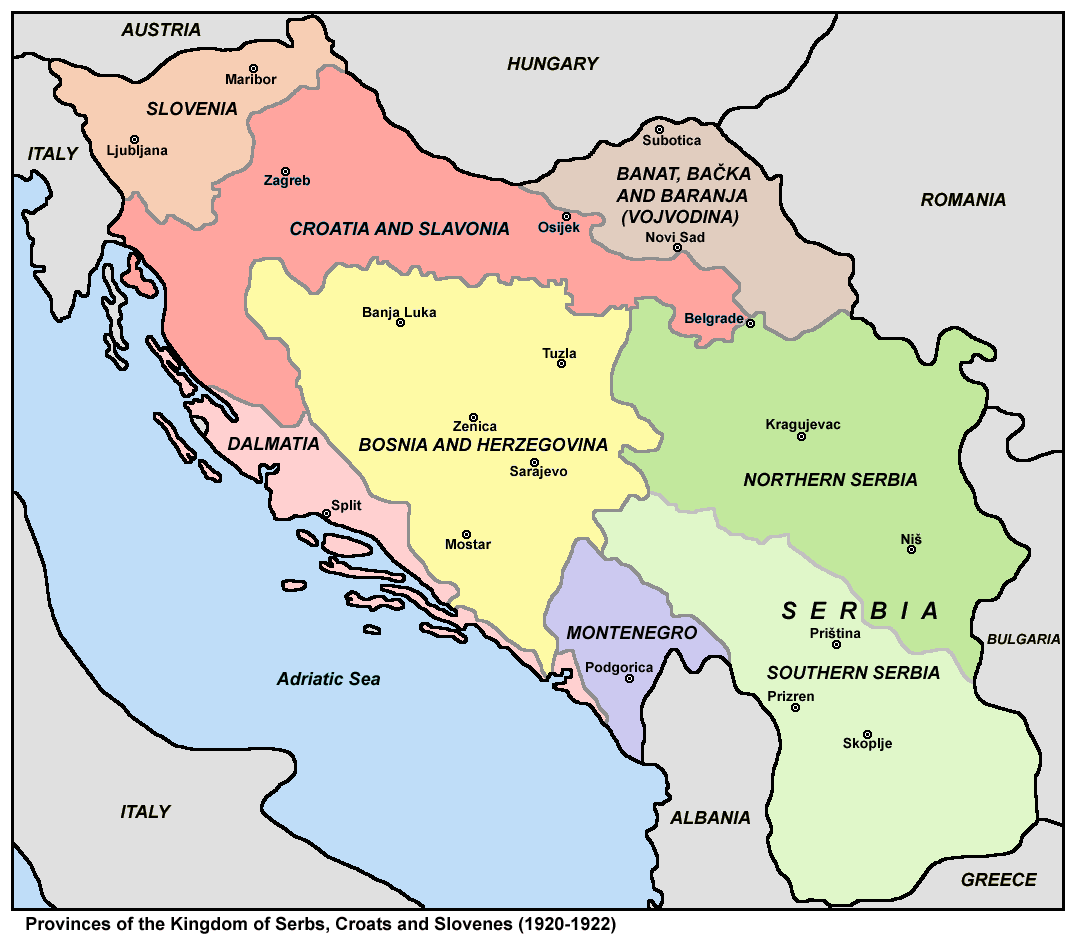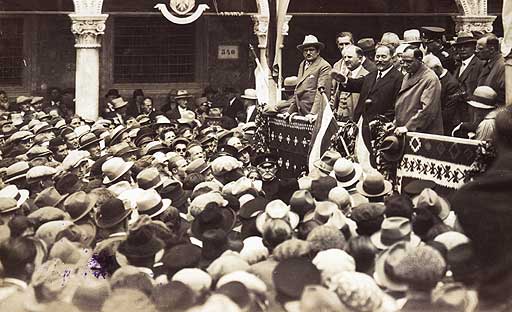|
Banovina Of Croatia
The Banovina of Croatia or Banate of Croatia ( sh-Latn-Cyrl, separator=" / ", Banovina Hrvatska, Бановина Хрватска) was an autonomous province ( banovina) of the Kingdom of Yugoslavia between 1939 and 1941. It was formed by a merger of Sava and Littoral Banovina, Littoral Banovinas of the Kingdom of Yugoslavia, banovinas into a single autonomous entity, with small parts of the Drina Banovina, Drina, Zeta Banovina, Zeta, and Danube Banovina, Danube banovinas also included. Its capital was Zagreb and it included most of present-day Croatia along with portions of Bosnia and Herzegovina and Serbia. Its sole Ban of Croatia, Ban during this period was Ivan Šubašić. Background In the Vidovdan Constitution of 1921, the Kingdom of Serbs, Croats and Slovenes had established 33 administrative districts, each headed by a government-appointed prefect. Both the Vidovdan Constitution in general and the administrative districts in particular were part of the design of Nikola Pa ... [...More Info...] [...Related Items...] OR: [Wikipedia] [Google] [Baidu] |
Subdivisions Of The Kingdom Of Yugoslavia
The subdivisions of the Kingdom of Yugoslavia (initially known as the Kingdom of Serbs, Croats, and Slovenes) existed successively in three different forms. From 1918 to 1922, the kingdom maintained the pre-World War I subdivisions of Yugoslavia's predecessor states. In 1922, the state was divided into 33 ''oblasts'' or provinces and, in 1929, a new system of nine banates (in Serbo-Croatian, the word for "banate" is ''banovina'') was implemented. Pre-Yugoslav subdivisions (1918–1922) From 1918 to 1922, Kingdom of Serbs, Croats, and Slovenes continued to be subdivided into the pre-World War I divisions of Austria-Hungary and the formerly independent kingdoms of Serbia and Montenegro. Provinces (''pokrajine'') were: # Slovenia # Croatia and Slavonia # Dalmatia # Bosnia and Herzegovina # Banat, Bačka and Baranja # Serbia ## Northern Serbia ## Southern Serbia # Montenegro These were subdivided into districts and counties: # District of Andrijevica (former Montenegro) # Distric ... [...More Info...] [...Related Items...] OR: [Wikipedia] [Google] [Baidu] |
Autonomous Province
Autonomous province is a term for a type of province that has administrative autonomy. accessed 4 Feb 2020 In political history, the term has been used as designation for various types of autonomous entities, on medium levels of administrative hierarchy. In relative terms, an autonomous province usually has less autonomy than an '''', but more autonomy than an ''''. Administrative autonomy of a province can be expressed in its official name, by the use of a particular term designating the autonomy, but such term can also b ... [...More Info...] [...Related Items...] OR: [Wikipedia] [Google] [Baidu] |
Croatian Republican Peasant Party
The Croatian Peasant Party ( hr, Hrvatska seljačka stranka, HSS) is an agrarian political party in Croatia founded on 22 December 1904 by Antun and Stjepan Radić as Croatian Peoples' Peasant Party (HPSS). The Brothers Radić believed that the realization of Croatian statehood was possible within Austria-Hungary, but that it had to be reformed as a Monarchy divided into three equal parts – Austria, Hungary, Croatia. After the creation of Kingdom of Yugoslavia in 1918, Party requested for the Croatian part of the Kingdom to be based on self-determination. This brought them great public support which culminated in 1920 parliamentary election when HPSS won all 58 seats assigned to Croatia. In 1920, disgruntled with a bad position of Croats in the Kingdom, the party changed its name into Croatian Republican Peasant Party (HRSS) and started advocating secession from the Kingdom and the establishment of ''"peaceful peasant Republic of Croatia"''. On 1923 and 1925 election, HRSS ... [...More Info...] [...Related Items...] OR: [Wikipedia] [Google] [Baidu] |
First World War
World War I (28 July 1914 11 November 1918), often abbreviated as WWI, was one of the deadliest global conflicts in history. Belligerents included much of Europe, the Russian Empire, the United States, and the Ottoman Empire, with fighting occurring throughout Europe, the Middle East, Africa, the Pacific, and parts of Asia. An estimated 9 million soldiers were killed in combat, plus another 23 million wounded, while 5 million civilians died as a result of military action, hunger, and disease. Millions more died in genocides within the Ottoman Empire and in the 1918 influenza pandemic, which was exacerbated by the movement of combatants during the war. Prior to 1914, the European great powers were divided between the Triple Entente (comprising France, Russia, and Britain) and the Triple Alliance (containing Germany, Austria-Hungary, and Italy). Tensions in the Balkans came to a head on 28 June 1914, following the assassination of Archduke Franz Ferdina ... [...More Info...] [...Related Items...] OR: [Wikipedia] [Google] [Baidu] |
Communist Party Of Yugoslavia
The League of Communists of Yugoslavia, mk, Сојуз на комунистите на Југославија, Sojuz na komunistite na Jugoslavija known until 1952 as the Communist Party of Yugoslavia, sl, Komunistična partija Jugoslavije mk, Комунистичка партија на Југославија, Komunistička partija na Jugoslavija was the founding and ruling party of SFR Yugoslavia. It was formed in 1919 as the main communist opposition party in the Kingdom of Serbs, Croats and Slovenes and after its initial successes in the elections, it was proscribed by the royal government and was at times harshly and violently suppressed. It remained an illegal underground group until World War II when, after the invasion of Yugoslavia in 1941, the military arm of the party, the Yugoslav Partisans, became embroiled in a bloody civil war and defeated the Axis powers and their local auxiliaries. After the liberation from foreign occupation in 1945, the party consolidated ... [...More Info...] [...Related Items...] OR: [Wikipedia] [Google] [Baidu] |
Svetozar Pribićević
Svetozar Pribićević ( sr-cyr, Светозар Прибићевић}, ; 26 October 1875 – 15 September 1936) was a Croatian Serb politician in Austria-Hungary and later Kingdom of Yugoslavia. He was one of the main proponents of Yugoslavism and a federalized South Slavic state which would later turn out to be Yugoslavia. However, he later became a bitter opponent of the same policy that was promoted by King Alexander I. Early life Pribićević was born into an ethnic Serb family in Kostajnica in 1875. As a youth he studied mathematics and physics in Zagreb. He joined other young, politically active Croats and Serbs in producing the periodical ''Narodna misao'' in 1897 which argued that Croats and Serbs were one nation, and that they should work together in Croatian politics. He took over leadership of the Serb People's Independent Party (''Srpska narodna samostalna stranka'') in 1903. In 1905, he and his party sponsored the Zadar Resolution, by which the Independents pr ... [...More Info...] [...Related Items...] OR: [Wikipedia] [Google] [Baidu] |


